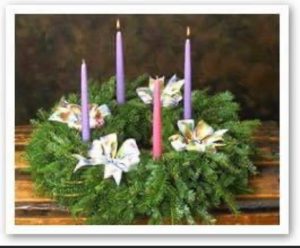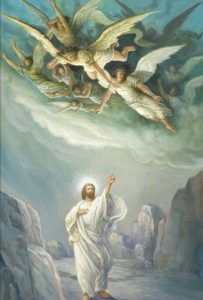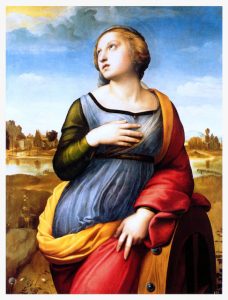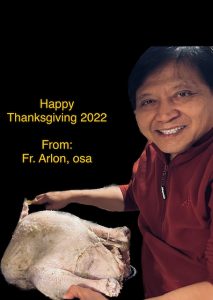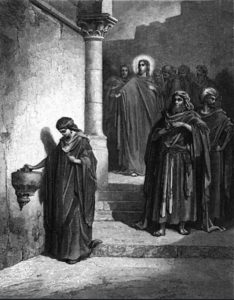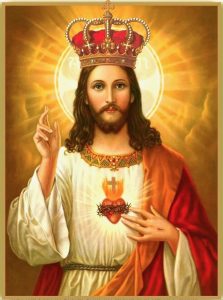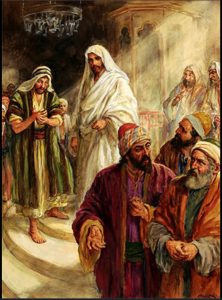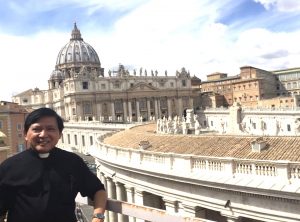The Dictate of the Heart: First Sunday of Advent, Year A
Today is the beginning of the new liturgical year A. It is the first Sunday of Advent. Advent means, “coming.” Advent reminds us of the birth of Jesus and directs our hearts to His final coming.
The readings today are indeed a call to closeness with God, in prayer, in charity and in sacrifices. The focus should be on the commemoration of the birth of Jesus and in anticipation of His final coming here on earth. We should not be preoccupied with so many parties, fancy meals, or be absorbed by consumerism in the department stores. The whole idea of this season is to rejoice in the coming of the Lord for we need to experience true joy and holy days of preparing for God’s gift of divine presence.
From the Book of the Prophet Isaiah, we hear an oracle about the holy mountain which will rise above all others and “all nations stream towards it” to which they will climb to the Lord’s Mountain so that they can learn the instructions and the ways of the Lord. This is the vision of the Prophet Isaiah about a new place for the presence of the Holy and One God. Just imagine that this vision was announced to the people seven hundred years before Jesus’ birth. This is something that shook the hearts of God’s chosen ones, something that was new in the people’s minds.
This coming of the Advent Season prepares us for a new perspective of faith in the light of this prophetic announcement. The light of the world will come to usher in a new experience of marching towards the mountain, temple, and church, because we have decided to walk and live together within the Light that this Advent candle represents with great symbolisms of hope, faith, joy, and peace.
The second reading from the book of St. Paul to the Romans 13: 11-14 is the favorite biblical passage of St. Augustine, which helped him realize the need for conversion. St. Paul writes, “Let us throw off the work of darkness and put on the armor of light. Let us conduct ourselves properly as in the day, not in orgies and drunkenness, not in promiscuity and lust, not in rivalry and jealousy. But put on the Lord Jesus Christ and make no provision for the desires of the flesh.” These words struck St. Augustine like a sharpened sword that pierced his heart with such great magnitude. This passage may be ours too. This is a call for rearranging our priorities in this season of Advent.
During the whole liturgical year A, our gospel will be taken from St. Matthew. He will be our guide and companion to know and understand Jesus. Today’s gospel begins with His words to His disciples about the downfall of the Jerusalem temple. It was a shock to some of the Apostles, and they asked Jesus how and when this will happen. From the minds of the Apostles, they were expecting a prediction about Jerusalem’s political fate, and so they were excited acquiring knowledge from their Teacher. I invite you to reflect with me on certain points we need to understand.
First, Jesus is not giving certain political statements. His main concern is to prepare them for a personal presence with God. Their relationship must be founded in a covenanted manner where there is completeness of trust and faith, total dependence on God, rather than things that are fleeting and temporal.
Second, their hearts must be focused, not on the temporal presence of the constructed temple, but by the very presence of Jesus in their midst. Jesus is a living temple. The finality of His coming remains an important lesson for us to be assured of Himself being the “solid stone and the very foundation” of the Kingdom of God.
Third, in the mentioning of the Ark of Noah, people were just unaware of their own disorder and living with no consideration of those warnings given to them. The flood came and wiped out those who were unfaithful. This image painted in the gospel of St. Matthew again gives a lesson of anticipation, for every page of the gospel wants us to pay attention about the warnings and signs of Christ’s final coming. Be attentive to our waiting!
The Holy Mother, the Church, is active and progressive in terms of social media in disseminating and proclaiming the Goodnews; however, we prefer more on FB reels and “tiktoks” which many of those are irrelevant in our relationship with Jesus. We become so much absorbed with humanity’s degeneration which is detrimental to our spiritual and moral life.
Let us pause during this season of Advent, a season that invites us to assess our relationship with Jesus as we prepare for Christmas. What can we do to make this season more meaningful in our search for a covenant with God?
Maranatha! Come, Lord Jesus!
Fr. Arlon, osa
Extraordinary Form Latin Mass Homily; First Sunday of Advent
Today is the first Sunday of Advent. Advent in Latin is “Adventus, which means the coming.” Who is coming to us? Well, we have a scripture record of the coming of the Messiah, Jesus Christ, through the Blessed Mother Mary’s cooperation. The coming of Jesus, as announced by an Angel and through the Holy Spirit, lives with us in history. This is the first coming which we know brought great joy and good news. The second coming is indeed serious business of which we need to be conscious. There have been many predictions of His return but all have failed to materialize.
This Advent season, the Holy Catholic Church invites us to set this time in prayer, penance, and sacrifices for more intense waiting of the Lord. When will this happen? Well, there is no exact time. As believers, we don’t need to be anxious but instead be able to continue the normal way of life as long as we are faithful in following His will.
I love this season of Advent as I hear beautiful songs or hymns of anticipation. I am excited to see beautiful signs of the season, like the Advent wreath, which tells us about Hope, Faith, Joy, and Peace. Some are putting up colorful lights, Christmas trees and decorations, to make the atmosphere a joyful waiting. External preparations for this season are enormous, so let us ask ourselves these questions: What would be the best action plan to make this season meaningful to me? What have I done with my interior preparation to make me feel this season? Maybe last year we were so preoccupied and failed to do our daily prayers for Advent or to help my family become closer to God? What is the best way to practice an act of charity, especially for those who are in need?
As time goes by, we may forget the essence of Advent and jump into the excitement of Christmas because we fail to see signs or anything that reminds us what Advent is about. Advent was a time of expectation, anticipation, and excitement. Yes, it meant Jesus would be born in Bethlehem, but it also meant to reflect profoundly as we look forward to His second coming, the “Parousia.”
Our first epistle, taken from the letter of St. Paul to the Romans, reminds us “Now is the hour for us to rise from sleep. For now, our salvation is nearer than when we believed.” These words invite us to work on things that are pleasing to God now, for our salvation is not far and remote. This is the favorite biblical passage of St. Augustine when he decided to straighten out his life to holiness and a change of heart.
Every 1st Sunday of Advent, we always hear a gospel text from St. Luke 21:25-33 that seems to describe the end of the world and the signs that will accompany that final coming. There will be signs to predict a future of impending end and the final coming. Being aware and understanding signs will lead us to:
First, knowing signs will not make us live in fear, but we will have a greater understanding of how we shape ourselves in accordance with the Lord’s teaching.
Second, our neglect and ignorance to see signs will further push us into the darkness instead of coming back to God and making amends. “There will be signs” are not Jesus’ words to threaten us. The signs are not a reason to hang our head in despair or be negative about life.
Third, Jesus never says these are the signs that the end of the world has come. Instead, he says that when we see the signs we are to stand up, raise our heads in prayer, and know that help is on the way; our redemption, our healing, and our Savior have drawn near.
Let us make clear that this advent is a season of well deserved preparation for all of us, realizing that indeed God promised to come again. The signs we hear and are yet to see are our hope and reassurance that God continues to walk with us and is alive in all circumstances of our lives.
We have so many beautiful stories, as well as sad stories, in life which still linger in our minds, such as the pain, worries and brokenness we have faced with resolute will not to give up but to hold on to Jesus, or having issues with a boyfriend or a girlfriend which resulted in a break up, or many years of marriage that were not fixed, or financial bankruptcy or loss of employment, etc. Maybe a faithful friend or a member of our family came to rescue us from discouragement and helped us be able to surpass those difficult moments that we went through and we survived. Miracles happen, clear signs of God’s presence, and now everything has been resolved because we became aware of those signs of Hope and Love.
Indeed, let us see this Advent season as an opening of new courage, confidence, and hope. Let us continue to do the work God has bestowed upon us. We heard His words today, “My words shall not pass away. Verba autem mea non transibunt.” Show O Lord thy ways to me and teach me thy paths. (Vias tuas, Domine, notas fac mihi: et semitas tuas edoce me.)
God bless you.
Fr. Arlon, osa
